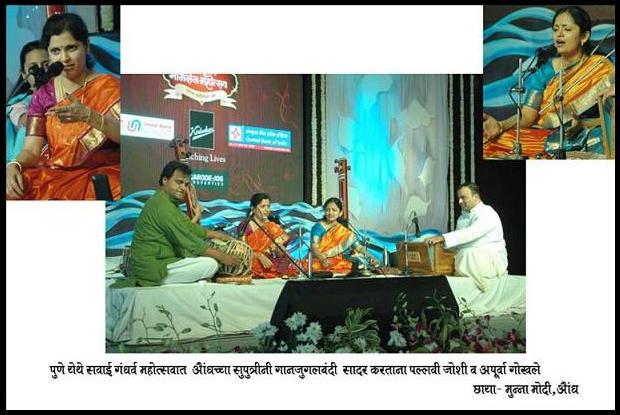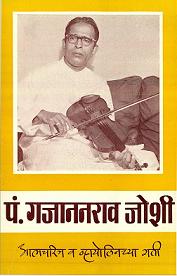
The fifth generation of Joshi Family (Gharana) is represented by Apoorva Gokhale and Pallavi Joshi who are the grand daughters of Pandit Gajananbuwa and daughters of Pandit Manoher Joshi.
The two sisters were invited to perform and participate in the famous and prestigious Sawai Gandharva Sangeet Mahotsava (Music Festival) . The Sawai Gandharva Festival was in it's 60th year in 2012. It was both an honour and a matter of pride for the two sisters to sing in the festival.
Pandit Gajananbuwa's disciples like Pandit Arun Kashalkar, Pandit Ulhas Kashalkar and Pandita Jayashree Patnekar have performed in the Sawai Gandharva Festival before. But for the first time Buwa's grand daughters presented Gajananbuwa's Gayaki that not surprisingly is more or less in their blood! Their performance was hugely appreciated and applauded by the music lovers. We give below some reviews in the newspapers relating to the performance of Apoorva and Pallavi.
Apoorva Gokhale and Pallavi Joshi have received rigorous training in the form of guru-shishya parampara under the guidance and supervision of their uncle Pandit Madhukarrao Joshi, an eminent vocalist and violinist. Simultaneously, Apoorva has also received guidance from her father Shri Manohar Joshi, her aunt Dr. Sucheta Bidkar and renowned vocalist of the same tradition, Padmashri Pt. Ulhas Kashalkar. Above all both Apoorva and Pallavi at a very young and tender age received tuition from their Grand Father Pandit Gajananbuwa.
The rich Gwailor Gayaki tradition of the Joshi Family that started by Pandit Antubuwa in the late 19th century continues in the beginning of the 21st century!
For more information about Sawai Gandharva Festival please check out the link: http://en.wikipedia.org/wiki/Sawai_Gandharva_Bhimsen_Festival
From Times of India
In the second session with which this year's festival concluded- singers Apoorva Gokhale and Pallavi Joshi displayed command on Raga Multani in vilambit bandish 'Kawan desh kari' and drut bandish 'More mandirava.' They then sang Raga Marwa with 'Ae maee ree' with 'Gunijan sab hot, gun ki charcha naahi' in drut beat. They finished with a Kabir bhajan, which got a big applause from the audience.
From DNA e-paper
The evening opened on time with the saha-gayan of the sister duo of Pallavi Joshi and Apoorva, granddaughters of Pt. Ganajanbua Joshi, a violin virtuoso and himself an eminent singer in the Gwalior tradition. Apoorva, a disciple of Manohar Joshi, Pt. Ulhas Kashalkar and Pt. Shankar Abhyankar; and Pallavi, who is a biotech graduate and an MBA, chose a different format for their presentation, choosing to sing bada-khayals in two ragas namely Multani and Marwa, instead of the set pattern of one longish raga, followed by a shorter bandish in another raga. The khayal in Multani was set in Jhoomra, a pet taal in the Gwalior style, and a first in this year's Sawai till now, whereas the one in Marwa was set in Tilwada, another Gwalior favorite.
Laykari was the predominant content of their presentation and their command over it was professional. The sisters could achieve a near perfect synchronisation between them, thanks to their rigorous talim in the Gwalior-Agra-Jaipur traditions. Apoorva with her well-rounded voice and Pallavi with a sharper and slightly nasal voice sang the jod bandish of Multani set in Teentaal, while the one in Marwa was set in Ektaal followed by a tarana set in Teentaal. While the duo had excellent command over laya, a more peaceful lingering on the notes to bring out the mood of the raga would be a welcome dimension to their presentation. They concluded with one of Kabir's bhajans.
From Marathi news paper 'SAKAL'. Review by Deepa Bhandare
महोत्सवातील शेवटच्या सत्राचा गानप्रारंभ संगीततपस्वी कै. गजाननबुवा जोशी यांच्या नाती असलेल्या अपूर्वा गोखले आणि पल्लवी जोशी यांच्या दर्जेदार सहगायनाने झाला. या दोघींनाही गायनाचा समृद्ध वारसा घरातूनच मिळाला आहे. याशिवाय अपूर्वा गोखले यांनी पं. उल्हास कशाळकर आणि पं. शंकर अभ्यंकर यांचं मार्गदर्शन घेतलं आहे. पल्लवीच्या गायनात ग्वाल्हेर, जयपूर, आग्रा या तिन्ही घराण्यांच्या गायकीचा मिलाफ आहे. तसंच ती बायोटेक्नॉलॉजी विषयाची पदवीधर आणि एमबीए अशी उच्चविद्याविभूषित आहे. तिच्या गाण्याविषयीच्या तळमळीचा आणि जिद्दीचा येथे आवर्जून उल्लेख करावासा वाटतो. तसंच सध्याच्या काळातील तरुण कलाकारांचा संघर्षमय प्रवासही मांडावासा वाटतो. पल्लवी ही मुंबईसारखा शहरात एका कंपनीत मार्केटिंग ऑफिसर म्हणून नोकरी करत असून, फिरतीच्या या नोकरीत आणि प्रवासात तिचे बारा तास संपतात. वेळ आणि शारीरिक क्षमतेची मर्यादा असूनही ती पहाटे आणि रात्री उशिरा रियाज करते, हे ऐकून मी स्तंभित झाले. या पार्श्वभूमीवर या वर्षी सवाईच्या स्वरमंचावर गायन सादर करण्याची योग्यता कमवून तिनं अत्यंत दमदार सादरीकरण केलं. याबद्दल तिचं विशेष कौतुक आणि अभिनंदन! या दोघी बहिणींनी आपल्या सहगायनाची सुरवात राग मुलतानीनं केली. झुमरा तालात "कवन देस गईलवा' हा ख्याल, तर त्रितालात "मोरे मंदिरवामें' ही चीज त्यांनी अत्यंत तयारीने सादर केली. "रिदन' या शब्दांद्वारा दोघींनीही बंदिशीपूर्वीच्या दोन आलापांनीच आपल्या मार्दव स्वरात मुलतानीचा करुणरस छान उभा केला. दोघींमधील "स्वरसंवाद' उत्तमपणे जपत गाण्याचं प्रवाहीपण टिकवत त्यांनी रागाची सफाईदार मांडणी केली. "सुरेल नादमधुर आवाज, स्वर आणि लयीवर उत्तम प्रभुत्व, सूक्ष्म लयीशी क्रीडा करत बेहलाव्यांच्या आधारे बंदिशीच्या अंगाने केलेली रागबढत, रंजक लयकारी, वेगवान पिळदार पेचदार नावाचं वैविध्य ही त्यांच्या गायनाची वैशिष्ट्यं होती. पल्लवीच्या गायनावर कै. गजाननबुवांच्या गायकीचा प्रभाव असून, विशेषतः तिची बोलआलापी आणि बोल-ताना ऐकताना गजाननबुवांची प्रकर्षाने आठवण झाली. यानंतर त्यांनी मारवा रागात "ऐ माईरी मजधार...' हा तिलवाडातील ख्याल, "ओ गुनीयन मिल' ही द्रुत एकतालातील बंदिश आणि त्रितालात एक तराणा सादर करून सायंकालीन कातरवेळेत हुरहूर लावणाऱ्या मारव्याचा रंग प्रभावीपणे मांडला. या वर्षीच्या महोत्सवात हा संधिप्रकाशकालीन राग प्रथमच मांडला गेला. मारवा हा गायला कठीण राग असून, गजाननबुवांच्या गायकीच्या पठडीत उत्तम तालीम मिळालेल्या कलाकारांचा त्यात हातखंडा आहे; याचंच दर्शन या दोघींच्या गायनातही झालं. तारसप्तकातील तेजस्वी रिषभानं निर्माण केलेली व्याकुळता, त्यानंतर कल्पक स्वरावलींद्वारा ठेवलेली तारषड्जाची आस आणि नंतर अचानक प्रकाशमान केलेला तारषड्ज याची भावस्पर्शी मांडणी करत अपूर्वा आणि पल्लवीने रसिकांची भरभरून दाद मिळवली. संत कबीरांच्या "अवधो माया तरी न जाये' या भजनाने त्यांनी आपल्या रंगतदार सहगायनाची सांगता केली. त्यांना तबल्यावर भरत कामत, तर संवादिनीवर सुयोग कुंडलकर यांनी समर्पक साथ केली.
--Dattaji and Bacchubhai
 Click to read
Click to read The fifth generation of Joshi Family (Gharana) is represented by Apoorva Gokhale and Pallavi Joshi who are the grand daughters of Pandit Gajananbuwa and daughters of Pandit Manoher Joshi.
The two sisters were invited to perform and participate in the famous and prestigious Sawai Gandharva Sangeet Mahotsava (Music Festival) . The Sawai Gandharva Festival was in it's 60th year in 2012. It was both an honour and a matter of pride for the two sisters to sing in the festival.
Pandit Gajananbuwa's disciples like Pandit Arun Kashalkar, Pandit Ulhas Kashalkar and Pandita Jayashree Patnekar have performed in the Sawai Gandharva Festival before. But for the first time Buwa's grand daughters presented Gajananbuwa's Gayaki that not surprisingly is more or less in their blood! Their performance was hugely appreciated and applauded by the music lovers. We give below some reviews in the newspapers relating to the performance of Apoorva and Pallavi.
Apoorva Gokhale and Pallavi Joshi have received rigorous training in the form of guru-shishya parampara under the guidance and supervision of their uncle Pandit Madhukarrao Joshi, an eminent vocalist and violinist. Simultaneously, Apoorva has also received guidance from her father Shri Manohar Joshi, her aunt Dr. Sucheta Bidkar and renowned vocalist of the same tradition, Padmashri Pt. Ulhas Kashalkar. Above all both Apoorva and Pallavi at a very young and tender age received tuition from their Grand Father Pandit Gajananbuwa.
The rich Gwailor Gayaki tradition of the Joshi Family that started by Pandit Antubuwa in the late 19th century continues in the beginning of the 21st century!
For more information about Sawai Gandharva Festival please check out the link: http://en.wikipedia.org/wiki/Sawai_Gandharva_Bhimsen_Festival
The fifth generation of Joshi Family (Gharana) is represented by Apoorva Gokhale and Pallavi Joshi who are the grand daughters of Pandit Gajananbuwa and daughters of Pandit Manoher Joshi.
The two sisters were invited to perform and participate in the famous and prestigious Sawai Gandharva Sangeet Mahotsava (Music Festival) . The Sawai Gandharva Festival was in it's 60th year in 2012. It was both an honour and a matter of pride for the two sisters to sing in the festival.
Pandit Gajananbuwa's disciples like Pandit Arun Kashalkar, Pandit Ulhas Kashalkar and Pandita Jayashree Patnekar have performed in the Sawai Gandharva Festival before. But for the first time Buwa's grand daughters presented Gajananbuwa's Gayaki that not surprisingly is more or less in their blood! Their performance was hugely appreciated and applauded by the music lovers. We give below some reviews in the newspapers relating to the performance of Apoorva and Pallavi.
Apoorva Gokhale and Pallavi Joshi have received rigorous training in the form of guru-shishya parampara under the guidance and supervision of their uncle Pandit Madhukarrao Joshi, an eminent vocalist and violinist. Simultaneously, Apoorva has also received guidance from her father Shri Manohar Joshi, her aunt Dr. Sucheta Bidkar and renowned vocalist of the same tradition, Padmashri Pt. Ulhas Kashalkar. Above all both Apoorva and Pallavi at a very young and tender age received tuition from their Grand Father Pandit Gajananbuwa.
The rich Gwailor Gayaki tradition of the Joshi Family that started by Pandit Antubuwa in the late 19th century continues in the beginning of the 21st century!
For more information about Sawai Gandharva Festival please check out the link: http://en.wikipedia.org/wiki/Sawai_Gandharva_Bhimsen_Festival